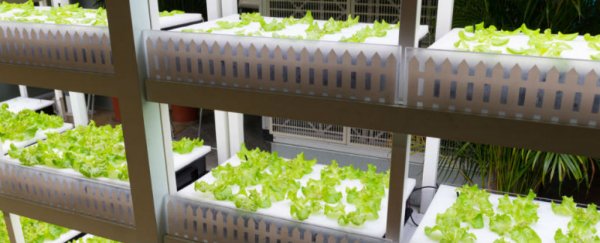All those farmers out there: you might want to think about switching careers (or looking forward to retirement), because Spread, a company based in Kyoto, Japan, says it wants to make the world's first fully autonomous farm within the next two years. The firm hasn't gone into huge amounts of detail about its plans, but the technology is reportedly in place to make its ambitions a reality by 2017.
Koji Morisada from Spread explained to reporters this week that robots will take care of almost every aspect of the farm's operations, from watering the seeds to harvesting the crops. That crop will be nothing but lettuce to begin with - an area the company already has an extensive amount of experience in - and it's expected that some 30,000 heads of lettuce could be produced every day once the farm is fully operational.
Humble human beings are still going to be required for one important task, however: planting the seeds.
The grounds of the farm will cover 4,400 square metres (around 47,360 square feet), with lettuce growing on shelves stacked from the floor to the ceiling. One of the big benefits of having robots running the operation instead of humans is there's no need to facilitate so much elbow room. And that means more lettuce space.
Spread hopes that its robot-run farm will cut down on energy usage as well as personnel costs. A growing number of businesses in Japan are looking to robots to fill gaps in the labour workforce and boost its economy. Unlike human beings, they're able to work around the clock and don't even ask for any monetary reward at the end of the day.
According to Spread, the pesticide-free lettuce produced by its new project will have more beta carotene than other farm-grown lettuce. Beta carotene is a well-known antioxidant and helps the body produce vitamin A (it's also the pigment that gives carrots their orange colouring). Even if you have philosophical qualms about robots growing your food, it should be very good for your body, at least.
While farms run entirely by robots are still some way off, the industry as a whole has embraced new technologies that can replace the role of human farmers in completing mundane, labourious, and even dangerous tasks. We've previously reported on the ways in which autonomy can boost production, and Spread will be hoping its robot-run lettuce farm will set the trend for similar projects in the coming years.
"In the future it will be difficult to steadily secure food using only conventional agriculture due to the rapid growth in population and other changes," says Spread's CEO Shinji Inada. "We believe our mission is to create innovations that can address the changing times based on the agricultural technology and skills that have been inherited from previous eras and take on an important role that will connect us to the next generation."
